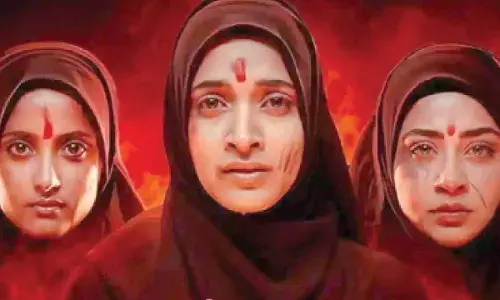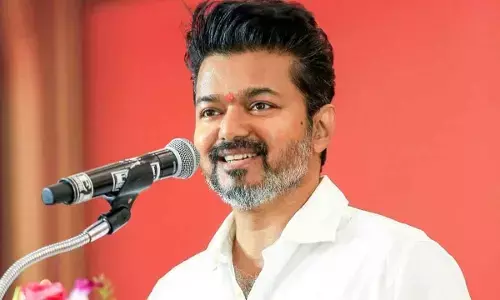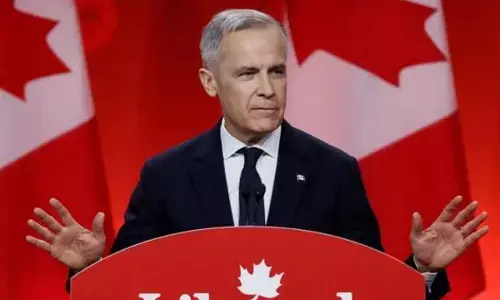MyVoice: Views of our readers 21st November 2021

MyVoice: Views of our readers 8th December 2021
MyVoice: Views of our readers 21st November 2021
Needed: A confidence-booster for ryots
Ever since the promulgation of the three Acts the entire country saw protests and resistances against these Acts, felt to be harmful to the farming community. As admitted by the concerned the Acts were to corporatise the entire Farm activities, to benefit a handful of firms. The fierce resistance came from the farmers of a few States, known primarily as agrarian states. Subsequently the entire country witnessed programmes in support of the agitating farmers. The resistance gained the proportion of a historic one drawing the attention of the entire world.
It became historic not only because of the number of physically participating farmers and the duration but also because of the avoidable acts of the rulers like wielding lathis, water, tear gas, labeling it as a movement organised by terrorists, crushing the protestors by car and so on. All these were watched by the people all over the country as well as the world. As a result the ruling party was losing miserably in all the elections held of late. Now as elections are due in main areas of the country and the support base dwindling fast as reflected in the 29 byelections held recently, in which the ruling party could win only seven the Prime Minister has at last decided not to take a chance and announced abruptly his willingness to withdraw all the three controversial farm Acts, besides conveying his apology and assuring to carry on consultation with various quarters involved in Agriculture. Though he has requested to withdraw the agitation forthwith the agitators have decided to wait till the government's move is completed in the Parliament. As the government is still having two more years of tenure there is a general apprehension that after a favourable result in the State elections further damages may be inflicted on the farmers. It is for the rulers to repose confidence in the minds of all.
— A G Rajmohan, Anantapur
Kudos to SC for historical judgement
The Supreme Court must be commended for setting aside a Mumbai High Court ruling that held that "skin-to-skin contact" between an accused person and a minor was necessary to establish a case under POCSO. The Mumbai High Court's verdict that groping a minor's breast without removing her clothes did not establish a case under POCSO had sparked off a controversy. Staying the High Court order, the SC said that the judgement was unprecedented and was likely to set a dangerous precedent.
It is a fact that over the years, there has been a substantial rise in the number of sexual crimes against children in the country. Unless strict punitive measures are taken, such crimes cannot be stopped. Sexual offences against children strip them of all dignity. When courts allow offenders to escape by trivialising their crimes, children are denied justice and deprived of their rights. Children subjected to sexual abuses develop psychological problems. It adversely affect their education and overall development. As they are the country's future citizens, it is the responsibility of all concerned to ensure their well-being. Courts must always deal with crimes against children with utmost care and seriousness. It must be noted that even a wrong touch is equal to an act done with sexual intent. It is worrisome that many offenders in sexual crimes against children get off scot-free due to lack of evidence, faulty prosecution or wrong judgements. When courts pronounce wrong verdicts in crimes against children, the hapless victims are left without any choice. As a consequence, people lose trust in courts. It must be noted that in many countries, sexual crimes against children are strictly dealt with and severe punishment is meted out to offenders. In contrast, in India such offenders do not get severe punishment. Despite the fact that capital punishment has been introduced for raping children, in most cases, such punishments are reduced to life imprisonment. A wrong move from the side of the judiciary will send a wrong message to society. Offenders will take advantage of it and it will lead to increase in such crimes.
— Venu G S, Kollam
Why did Punjab farmers lead the agitation?
The Green Revolution brought good income and happiness but that lasted for not more than a decade and a half. Standard of living increased for farmers. Paddy- Wheat rotation was in a way forced on Punjab for food security. Punjab's water/soil suffered. The cost of cultivation increased sharply. To meet costs, credit from banks and commission agents were taken in full bags which were also spent on maintaining the lifestyle by purchasing consumer goods, cars, on lavish marriages and houses etc .Big landlords(also politically connected)spending style was adopted by small and marginal farmers who could not sustain with borrowed funds in states like Punjab. Heavy in debt farmers resorted to suicides which still go on till today.
With the opening of the global economy, WTO agreements etc. food security for nations was assured through much of the cheaper imports even as food stocks are up to the brim in warehouses. No crop diversification to wean away farmers from wheat-paddy sowing honestly ever was promoted since there was no Agriculture policy either at Centre or in food producing states though agriculture is considered a state subject.
Farmers feared that with corporatisation of agri operations their MSP/Lands will be snatched and they will turn paupers. Their apprehensions are valid. They want MSP on all crops. Successive govts closed their eyes when issues of farm crisis stared them in the face. After the repeal of 3 laws in GOI must get serious with all stakeholders for framing a suitable National Agricultural Policy.
— Brij B Goyal, Ludhiana
Better late than never, Mr PM!
It's a great relief that Prime Minister Narendra Modi announced repealing of three farm laws which are centre of agitations by farmers facing odd situations and some sacrificing their lives and opposition parties going against Modi branding PM as anti-farmer( The Hans India, 20/11). There are different views on farm laws, some are for and others opposing.
Though farm laws are opposed mainly by the farmers of Punjab and UP, opposition parties have dragged it nationally. But repeal of farm laws do not invalidate the urgent need for reforms in the agriculture sector as farmers are most exploited section from the day one till the produce enters the market. It is most welcome that Prime Minister declared formation of a panel which include different sections of experts including representatives from states for a uniform and unanimous reforms to benefit the farmers as well as improving economy of the country from farm sector. Had Prime Minister appointed this panel before bringing an ordinance on three farm laws, his image would have gone up and there would not have been deaths among the protestors of farm laws and disturbance of law and order around Delhi and in few other states.
Repealing of farm laws is interpreted differently by different political parties, experts and observers with different opinions as a win to opposition parties and peoples victory in a democratic set up and government bowed to power of people against its own power. But whatever may be comments by many ,it is a fact that repealing farm laws is a blend of politics and rethinking on laws for any adverse effects on NDA, BJP in particular and most of the farmers are not well educated in new laws, the small farmers in particular ,for benefits to them.
Whatever may be the reason, all will be well that ends well for law and order situation and rest to agitating farmers as well as to political parties opposing them. Long break till the panel reports back to government. And now time for TV channels for hectic debates for why and how farmers are repealed as if it solves the issue!
— Jayaprakash Reddy, Nalgonda
What delights progressives is actually colonial consciousness
Vir Das, a stand-up comedian, is in the news in recent times for his speech on 'Two Indias' in a foreign country. The proponents of freedom of speech are supporting him while many do not agree that it can cross the limits to abuse one's country. The short speech was hardly comedy; it was also large on rhetoric and low on facts. At a larger level, this idea of an individual's freedom to say anything is a New Left phenomenon. 'Cultural Marxism', an offshoot of this, perpetuated in hallowed academic institutes like the JNU basically have a constant anti-state slant where the nation-state is a bourgeois fraud played upon the masses.
The rejection of any expression of national unity like in cricket or even Republic Day Parade is almost a normative behaviour at some institutes. Accordingly, the Indian nation-state is 'Brahmanical' and 'patriarchal'; is ideologically rooted in multiple 'evils' of the Hindu social order; and is fundamentally inclined towards the oppression of women, Muslims, and Dalits. This evolved into an oppressor-oppressed binary and spawning of the victimhood industry, with everyone claiming to be a victim of some oppressor.
An 'anywhere mindset' characterizes these cultural Marxists- an attitude which places a high value on autonomy, mobility and novelty and a much lower value on group identity, tradition, and national social contracts (faith, flag, and family). They are 'just individuals' and 'the personal is political.' The individual's political life is an extension of one's preferred identity by race, gender, sexual preference and so on carrying the potential of infinitely fragmenting politics. Thus, there is no end to the discovery of fresher victims and the endless atomisation of victimhood in our country. Indians, craving for prestige by its association with the west, become the willing allies of the Western academia in disrupting the cultural coherence of the non-western societies. No wonder Das speaks about Pakistan, and the colours of saffron and green to hint subtly at the narrow attitudes of the majority.
Colonial consciousness has not left academia, despite the talk of post-colonialism ironically. The social science disciplines (history, political science, economics, sociology) as we know them today originated in the west. This makes it impossible for a social scientist in a non-western society to speak with reference to traditions of knowledge indigenous to it. Our top academics, intellectuals, and public speakers (now comedians too), consciously or unconsciously, are eager to describe their country in terms supplied by the west to gain legitimacy. The implications of our academics viewing the Indian traditions of knowledge as being 'truly dead' are indeed serious. The cow must be food since it is so in the western hemisphere. It hits hard and hits fast at our civilizational roots.
The progressives have a habit of throwing abuse on anybody who does not agree with them and often calling them 'fascist'. By a strange logic, any call for unity in the name of patriotism also becomes fascistic. Respecting the flag becomes fascistic; national anthem played out in cinema halls becomes a fascistic move; and questioning of flag-burning and anti- India slogans become a new Nazism. One prominent left thinker, Dworkin, says that the right to speech exists to protect the dignity of the dissenters. Thus, the more silent and the more law-abiding your activities, the less you may protest the provocative utterances of those who do not care anything about your values. The voice of dissent is the voice of the hero. In other words, a truly sincere government, after having passed a law, will be lenient towards those who disobey it.
Being critical of family, institutions, society, culture, and the country is important but there should be a sense of time, place, and consequences before doing that. In this matter, it is equally wrong on the part of both Vir Das now and our Prime Minister in the past when he made critical remarks on Indian doctors on an international platform. It is perhaps a happy thing that colonial consciousness might be diluting a bit. At independence, our intellectuals spoke of a single bad India; now comedians talk about two Indias- one good and one bad. Some relief!
— Dr Pingali Gopal, Warangal




